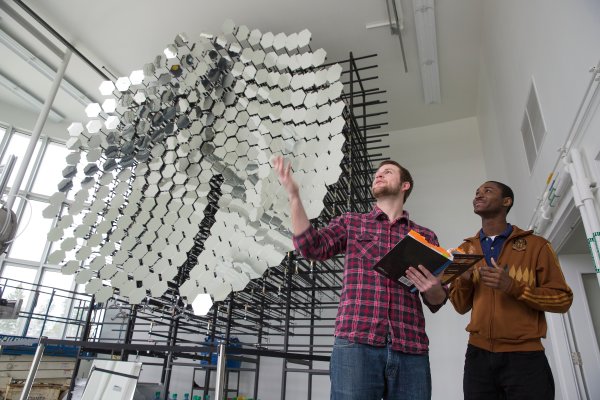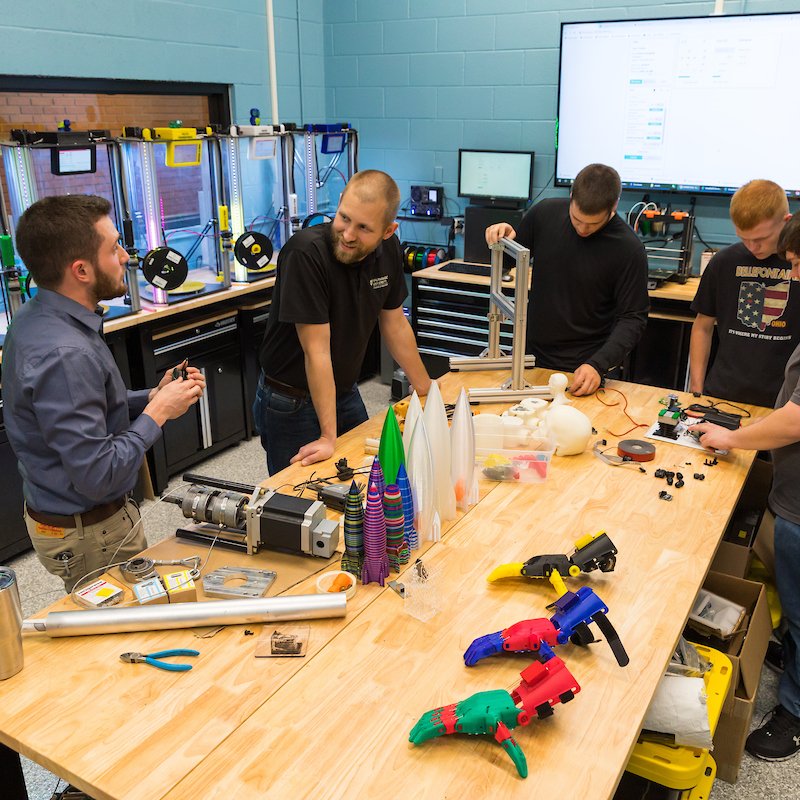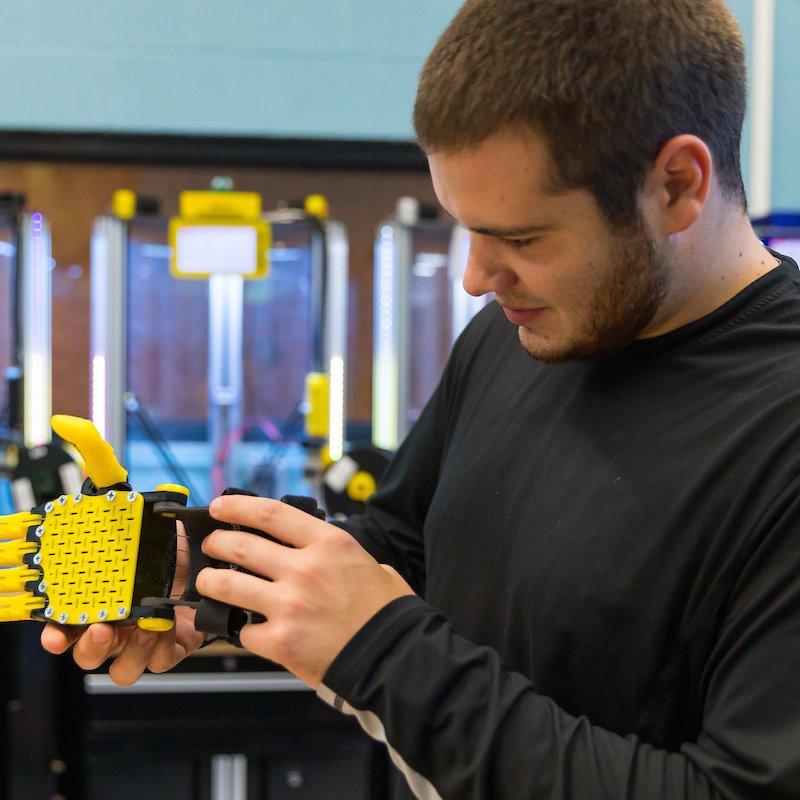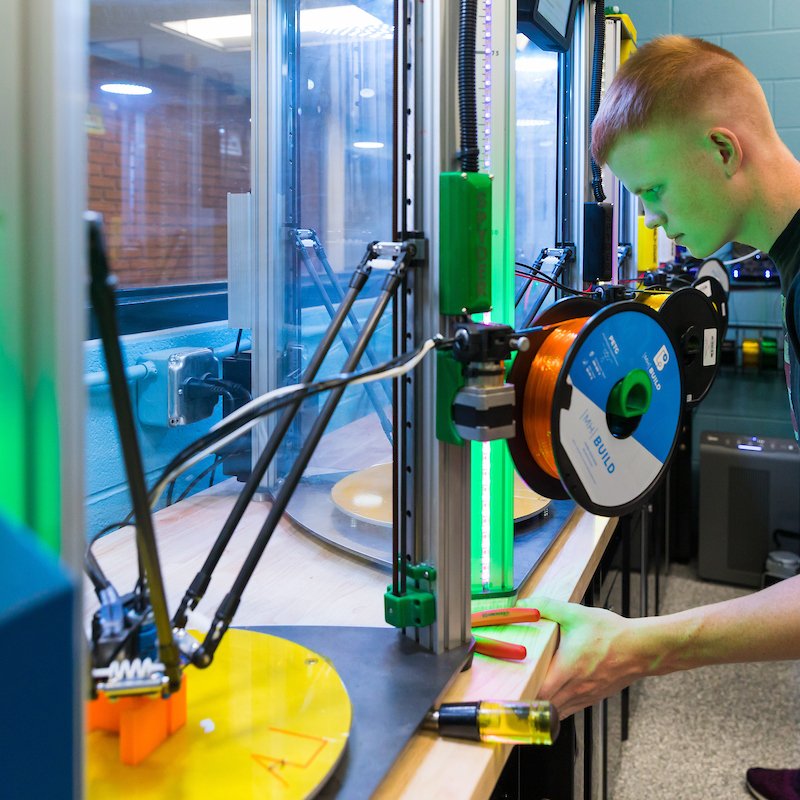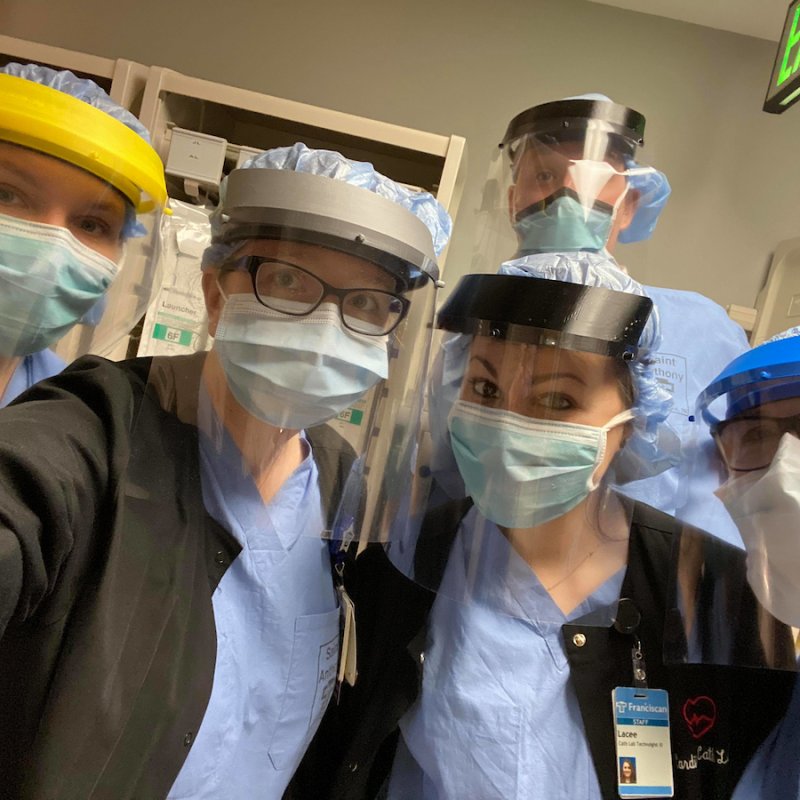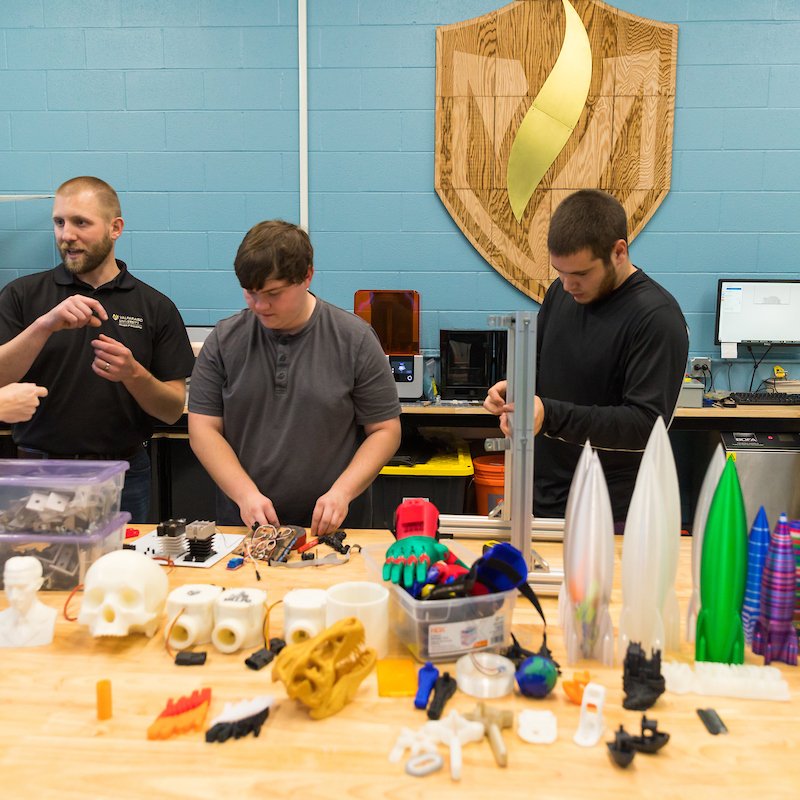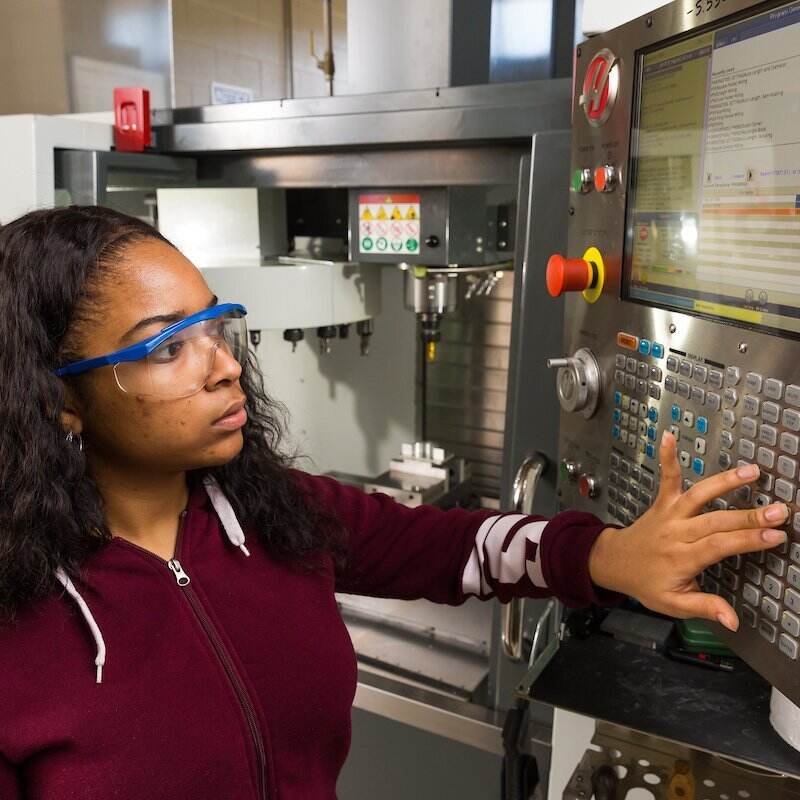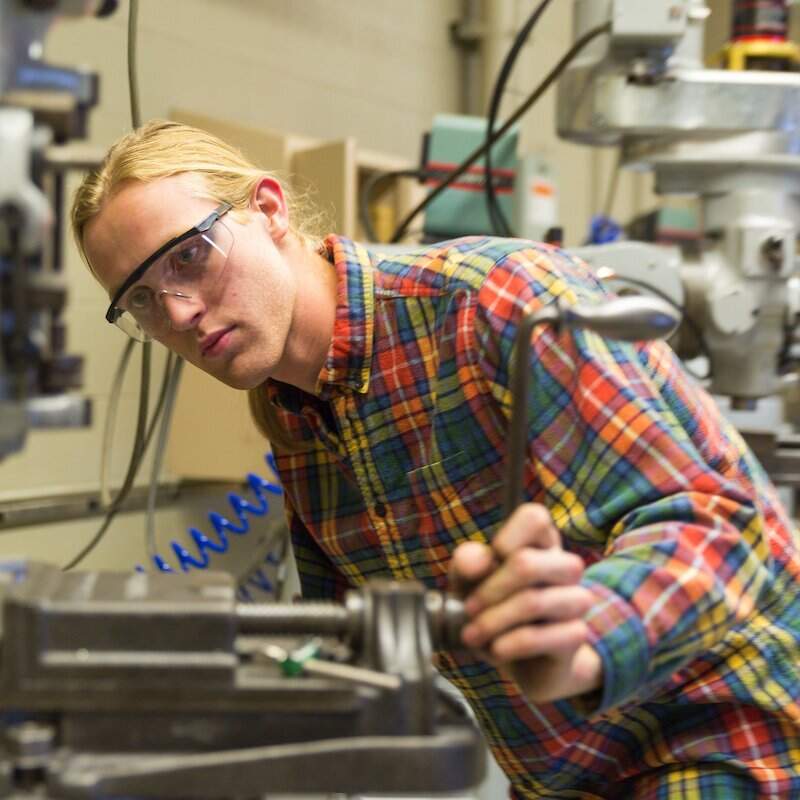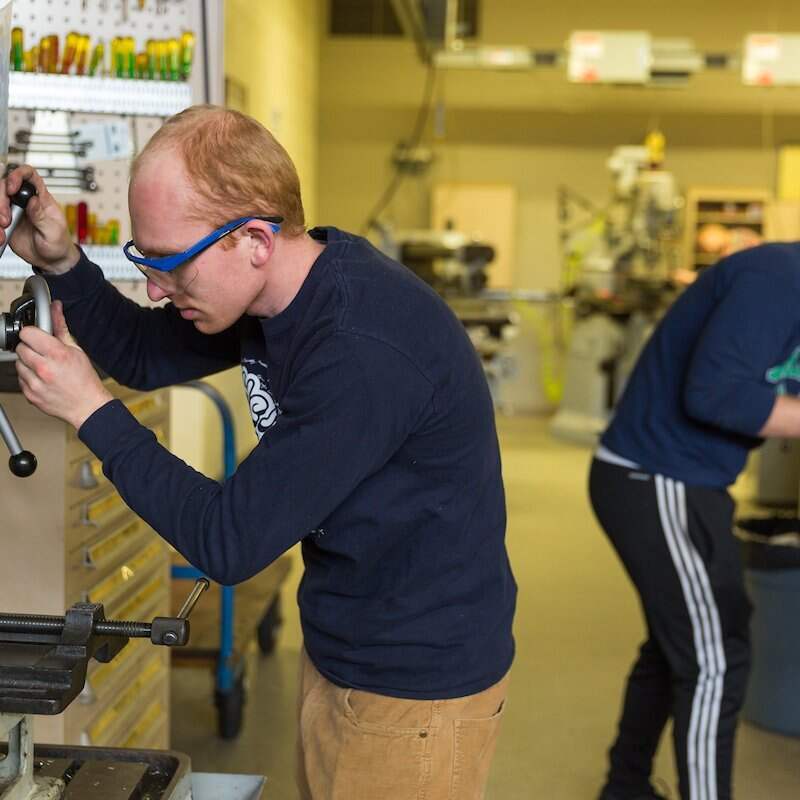Mechanical and Bioengineering Laboratories
Equipment
- Spyder Delta 3D Printers
The Spyder deltas are the workhorses of Valpo’s College of Engineering. They are custom designed and fabricated in-house to support the wide variety of student projects. These printers are FFF (Fused Filament Fabrication) style printers that can print PETG, PLA, Nylon, and TPU/TPE. - Formlabs Form 2
The Formlabs printer utilizes SLA (Stereolithography) technology that allows for high-resolution prints in a variety of materials. Students have the ability to print in ‘tough’ polymers, flexible silicone-like materials, and true ceramics. - Markforged Mark Two
The Markforged printer utilizes CCF (Continuous Caron Fiber) printing technology that embeds carbon fiber or fiberglass strands into nylon prints. This machine allows for parts that have near-aluminum rigidity. - Prusa i3
Prusa printers are used primarily to test out new materials, and/or to print additional parts if the Spyder printers are full. They also use FFF (Fused Filament Fabrication) technology. - Mosaic Palette 2
The Mosaic filament combiner allows for multi-colored and multi-material prints on the FFF printers. Valpo is performing research on the machine to see how combining different filament types can result in unique material properties. - Epilog Fiber Fusion 50W Laser
The Fusion is a fiber-based laser that allows for etchings of metals and ceramics. The main use in the College of Engineering is to fabricate circuit boards in-house, and to mark stainless materials. - Epilog Mini1812 CO2 40W Laser
The Mini laser is used for cutting and engraving of mostly polymer and organic materials. It is especially useful for fabricating jigs, and cutting out polymer or wood components for student projects.
The Energy Systems Suite is home to the Fluid Dynamics Laboratory, the Mechanical Measurements Laboratory, the Engine Test Cell, and the Small Engines Laboratory. This facility provides the opportunity to study the laws governing work, heat, and energy conversion and to explore the use of standard measurement equipment, calibration techniques, and computer data acquisition.
Fluid Dynamics Laboratory: students explore fundamental fluid dynamics concepts using the wind tunnel and the supersonic nozzle.
Mechanical Measurements Laboratory: students learn the science of experimental methods by working with state-of-the-art measurement equipment, calibration techniques, and computer data acquisition.
Engine Test Cell: students explore and analyze the performance of a Caterpillar diesel engine.
Small Engines Laboratory: students operate a Cooperative Fuel Research engine and a natural gas turbine to study their performance and compare to theory discussed in their thermodynamics coursework.
Equipment
- Mechanical Measurements Laboratory
- Oscilloscopes
- National Instruments Data Acquisition and Signal Processing Hardware
- LabVIEW Software
- Function Generators
- Heat Power Laboratory
- Axial Flow Fan
- Wind Tunnel
- Diesel Engine
- Gasoline Engine
- Gas Turbine
- Supersonic Nozzle
- Solar Collector
- Heat Pump
- Wind Turbine
- Thermodynamics II
- Cooperative Fuel Research Engine
The mechatronics, vibrations, and controls laboratory provides students with hands-on experience in four areas of mechanical engineering:
- In mechatronics, students learn the fundamentals of automation such as digital logic, microcontrollers, programmable logic controllers, robotics, sensors, and pneumatics.
- In vibrations, students learn how structures react to a variety of input forces.
- In controls, students learn how to guide or regulate the operation of machines or processes.
- In analog circuits, students learn how to design and implement electrical circuits.
Equipment
Mechatronics
- Allen Bradley MicroLogix PLCs
- PIC Microcontrollers and Development Boards
- Baldor Servo Motors and Ball Screws
- Pnuematic Material Handling Systems
- MatLab and Simulink Software
- LabVIEW Software and Sound and Vibration Toolkit
- National Instruments Data Acquisition and Signal Processing Equipment
- TTL Logic Training Kits
Vibrations
- Piezotronics Impact Hammers
- Piezotronics Accelerometers and Force Transducers
- TIRA Shaker
- Robot: ABB IRB140 6-Axis Industrial Manipulator with IRC5 Controller
Controls
- NI PCI-6014 M Series Data Acquisition (DAQ) Card
- NI BNC-2120 Signal Processing Unit
- NI LabVIEW software
- NI Control Design and Simulation (CDSim ) module
- Pulse With Modulation (PWM) Servo DC Motor Drivers
- Process Simulator (Electrical System)
- Temperature Control Stations (Thermal System)
- Pendulum Position Control Stations (Mechanical System)
- Servo DC Motor Position and Speed Control Stations (Electro-Mechanical System)
- Siemens P, PI, PID Industrial Controllers
Analog Circuits
- PSPICE Circuit Simulation Software
- Tektronix Digital Oscilloscopes
- Agilent Function Generators
- Circuit-Specialists Power Supplies
- Fluke Bench Multimeters
- Solderless breadboard
- Aluminum Cantilever Beam with Strain Gauges
- Miscellaneous (Cd-S photocells, DC motors, Buzzers, LEDs, Diodes, etc)
The Senior Design Laboratory in the new Fites Engineering Innovation center is shared by mechanical, civil, and electrical and computer engineering students. Teams of civil engineering students are assigned to work areas that mimic the actual workplace environment that they will encounter upon graduation. Within these areas, the students collaborate on a two semester project to complete a civil engineering project. Examples of projects include highway interchanges, building structures, water removal systems, etc. As an added bonus, senior engineering students have their own workspace for study groups, computer use, etc.
The James S. Markiewicz Manufacturing and Project Center includes the following laboratories:
- Manufacturing Processes Laboratory
- CNC Machining Laboratory
- Welding Laboratory
- Projects Laboratory
The laboratory is staffed by a full-time technician. After students are trained on the equipment, they may use the laboratory for student organization projects and Senior Design projects.
Projects Laboratory
During the fall semester, the projects laboratory is used by freshmen engineering students as part of the GE 100 course. During the spring semester, the projects laboratory is used by senior mechanical and electrical engineering students to assemble and test their senior design projects.
Equipment
- Haas TM-1 Vertical CNC Machining Center
- Haas VF-1 Vertical CNC Machining Center
- Haas TL-1 CNC Lathe
- Spetrum Rapid Prototyping Machine
- MIG Welder
- TIG Welder
- Manual Mills
- Manual Lathes
- Drill Presses
- Cut-off Saw
- Shears
- Presses
- Punches
